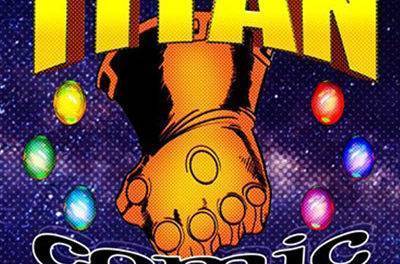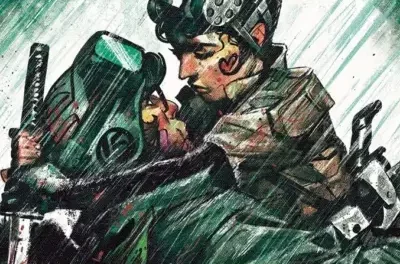 Lilah Sturges is an accomplished comic writer with titles such as Jack of Fables, House of Mystery, and Public Relations. Recently she took to Facebook to announce to the world that she was a trans-woman. (You can find the whole post here: https://www.facebook.com/lilah.sturges/posts/1156757117726298) Shortly after the announcement, Lilah was nice enough to spend some time with THN to talk about her story, feminism in comics, and her thoughts on writing a trans character in comics in the future.
Lilah Sturges is an accomplished comic writer with titles such as Jack of Fables, House of Mystery, and Public Relations. Recently she took to Facebook to announce to the world that she was a trans-woman. (You can find the whole post here: https://www.facebook.com/lilah.sturges/posts/1156757117726298) Shortly after the announcement, Lilah was nice enough to spend some time with THN to talk about her story, feminism in comics, and her thoughts on writing a trans character in comics in the future.
Ryan Mount for Two-Headed Nerd: Congrats to you on your new lease on life. I cannot truthfully fathom everything that is happening in your life right now. Are you taking any time off to handle all of the logistics? My wife had to take a whole day off just for a name change when we got married. I cannot imagine the sheer amount of paperwork you now must deal with, on top of all the emotional changes happening.
Lilah Sturges: Thanks! I’ve spent the past week or so in kind of a daze. It’s a bizarre, surreal experience to suddenly, finally have the thing that you’ve been silently dreaming of for years and were afraid you might never have. Everything is different and new, despite the time I’ve spent preparing for all of it.
I’m still trying to take things one step at a time, and all the name/gender marker change stuff is a whole kettle of fish I’ve just started to think about tackling. The list of stuff that’s required to get your gender marker changed on a Texas driver’s license requires a court order, letters from doctors, fingerprints, and (I assume) some kind of signed agreement never to follow Ted Cruz’s daughter into a bathroom.
THN: What is one thing that you were just totally unprepared for while going on this journey?
LS: The astonishing amount of support that I received when I finally did come out publicly. I figured that I’d get a few comments on Facebook or whatever, mostly positive and some negative, but the response has been gigantic and uniformly positive, coming from comics creators I barely know and lots of fans, friends, and family members. That kind of support is so helpful for a trans person because coming out is terrifying and your biggest fear is of being rejected by the people you care about. Not a single person has said a negative thing to me (to my face); anyone who couldn’t get on board I guess just sort of quietly backed away, but that was maybe one or two people that I cared about at all.
THN: Is there anything you want fans and everyone to know about your story?
LS: My story is just one of the thousands and thousands of trans stories. My story is a best-case scenario in a lot of ways: I have a job, a family that loves and accepts me, support system, access to good mental and physical health services. And despite all those benefits, coming out to myself and to the world has been an extraordinary challenge that’s required me to overcome fear, shame, self-loathing, and bitterness. A lot of trans people don’t have the privileges I do; they must face all the challenges that I did, but without some or any of the support that I’ve had.
People don’t transition because they think it’ll be a nifty thing to do; in a lot of cases it’s a matter of life and death. Living as a gender that you can’t identify can be painful; it usually creates an omnipresent, powerful dissonance called dysphoria that takes a lot of different forms, but for me and a lot of other people it manifests as a sense of revulsion or severe discomfort regarding one’s body, especially the secondary sex characteristics like body hair, face shape, naughty bits, etc. That dysphoria, added to the ubiquitous discrimination against trans people in society can be crippling. Trans people are twice as likely to live in poverty than average, and 40% of trans people have attempted suicide in their lifetimes. To put that in perspective, the US average is 4.6%. It’s important for people to understand how serious the consequences of our attitudes are.
THN: How long have you had the inkling that you were a woman?
LS: This is a difficult question to answer. I was always aware that I was “different” in some way, but when I was growing up in the 70s and 80s there was no notion of “transgender.” The only depictions you ever saw were freak show-like references to people like Christine Jorgenson, who was a tabloid sensation in the 1950s for having undergone what was then called “sex reassignment surgery” (but is now more properly called Gender Confirmation Surgery). That, or jokes about transvestites and “female impersonators.” There wasn’t any kind of positive representation.
Whatever feelings I had about my gender I suppressed militantly for years; they managed to pop up here and there but mostly I kept them hidden even from myself. When transgender subjects started becoming more prevalent in the 1990s, I would talk about how I was “fascinated” with the subject, but still never admit to myself that there was a reason for that. When I was in my twenties, I wrote a song that contained the lyrics “All of your life you’ve been putting up with everything/while always putting yourself down./It’s time to loosen your tie and address this goddess that’s been inside you/all of your life./She will get her way.” It was a telling verse, but if you’d asked me at the time I would have insisted that I had no idea what it meant, or that I was just being “edgy.”
It wasn’t until 2012, when I saw Lana Wachowski give her excellent speech upon receiving the HRC Visibility Award, that I was no longer able to pretend I wasn’t transgender. The Wachowskis are creators whose work I love and admire, and seeing her on that stage expressing herself with such charm, humor, and grace finally gave me a role model that mirrored what I secretly desired for myself. And even then it took me almost five years to process that knowledge.
It’s important to note that my story, again, is just one of many trans stories. For years, the overarching trans narrative was that of the little boy who went to bed every night from the age of four praying to wake up as a girl. Because that wasn’t my experience, I assumed for many years that I wasn’t trans. That specific trans narrative ignores people who’ve made that realization later in life and it also ignores trans men, whose realizations are often complicated by the fact that in our culture a girl who “acts like a boy” is shrugged off as a “tomboy” and that sideways form of acceptance can be confusing for trans men who begin questioning their gender identity later.
Pull quote for all this: if you’re questioning your gender in any way, it’s legitimate. You don’t have to prove your transness to anyone and odds are that once you start looking into it you’ll recognize yourself in lots of other trans stories.
THN: You have had a lot of writing successes over the years. Your work in the Fables universe seems like it will never go out of print. With new publications of your work, have you talked with anyone about putting “Lilah Sturges” on the cover and in the credits moving forward?
LS: That depends, and I’ve wrestled with it a little bit. Certainly for new stuff that comes out, starting with Everafter #6, everything I do will say “Lilah” on it. For older stuff, like the new Jack of Fables deluxe hardcover editions, I’ve asked to keep the old name on there just to avoid confusion. One exception I might make would be if they ever reprinted House of Mystery, but that doesn’t seem likely. Honestly, I don’t really care that much, although I understand and would back the play of anyone who asked to have their work retroactively re-credited.
THN: I noticed the title of one of your prose books is called “Beneath the Skin” and one tale included was “The Odd Within.” Correct me if I am wrong, but the character was dealing with hearing voices in her head. To be clear, I am not comparing your or anyone’s transition to mental illness but, being born the incorrect gender, was there a voice inside of you saying something was not correct? Many creative types interject personal struggles into their work while keeping it entirely fictional. The first example that comes to mind is Dennis Hopeless, who seems to put a lot of new fatherhood feelings and thoughts into the pages of Spider-Woman. Was “The Odd Within” your way of dealing with the reality that you knew in your heart you were a woman?
LS: The story you’re referencing is one that I don’t think succeeds all that well (I’m tempted to say that it’s hot garbage but I can’t make myself read it so I’m not sure), so I’m going to gloss over it, because mental health issues have been a persistent theme in a lot of my work. Like many trans people, I’ve suffered with deep depression and anxiety for most of my life and it’s impossible for that not to have had an effect. I can’t really go at it directly — I’ve always found depression to be mind-numbingly tedious as a subject for fiction — but I can explore other things as a metaphor for the emotional struggles I’ve faced. My goal in writing isn’t simply to express how I feel about something but trying to find ways to connect how I feel to things that everyone has felt, so we can get a sliver of shared understanding that we didn’t have before.
The most successful comic I’ve done in that regard is House of Mystery. Much of that series is me projecting my female self into the protagonist, Fig. The bit about “The Longing” in issue 4 of that series is directly related to me being transgender; interestingly, it’s also the most oft quoted thing I’ve ever written. There’s a lot of me in Fig, and a lot of her emotional history is my emotional history, including some absurdly personal things that no one will ever know are autobiographical except me.
THN: The larger comics industry has taken some flack for its treatment of women in the industry over the years. The situation at Marvel with Chelsea Cain and Mockingbird is a recent example. Do you see yourself having the same or similar obstacles as other women in the industry moving forward?
LS: I have no respect for the opinions of people who complain about “too much feminism” in art. Are they complaining about “too much sexism” in art? Because there’s a hell of a lot more open sexism in art than there is open feminism. Some wise person said “To the privileged, equality feels like oppression.” People who have been marginalized in the past simply aren’t willing to be marginalized anymore and the rest of society now must deal with that. It’s not going to go away, no matter how many bathroom bills or “religious freedom” acts get passed.
People want to pretend like there is such a thing as apolitical art, but even the statement “I don’t want politics in my art” is a strong political statement. What you don’t say is just as important as what you say. All art is political; all public discourse is political. As someone who has an identity that is is literally front-page political news, I don’t have the luxury of pretending otherwise, nor do I care to.
One of the great things about being trans is that it teaches you to trust yourself and stop worrying about what other people think. When you occupy a space outside the mainstream, the main stream starts to look far less appealing, and you begin to realize that the “mainstream” doesn’t have any philosophical currency. It’s just shibboleth.
The struggle will continue, but that’s okay. Struggles matter.
THN: What hopes do you have for transgendered characters in comics moving forward?
LS: I would love to write a superhero comic for one of the Big Two about a character (either a new character or a legacy character; I don’t want to be the lady who made someone’s favorite existing character trans and get all that hate mail) who is a valued member of the world they live in, in a way that is totally separate from their transness, and detail the struggle of transition on that operatic stage. That way I’d be able to put my own experience and emotion into it, because I think it would be awesome and because that kind of representation is still vitally important for trans readers and everyone else, too. I know that if I’d had a positive trans role model when I was young, and if other people in my community were aware of it as well, my life could have been very different, and it’s important to me to create that kind of positive change.
Also, I like writing books where people fly and hit things and blow stuff up, and I haven’t done that in a while.
THN: What advice do you have for anyone going through a similar situation?
LS: If anyone reading this is struggling with their gender identity I would first tell them that they are not crazy, there is nothing wrong with them, and that they have a right to be exactly who they are. I’d tell them to seek out a therapist who specialized in gender issues and start there. For teenagers, I’d suggest being very cautious and make sure that you are safe before making any moves regarding your gender expression. These days, teenagers themselves are often supportive of trans peers, but their parents are often very unaccepting, sometimes violently so.
But to anyone who might chance on this, I would mainly want to say that you deserve to be loved precisely as you truly are. You deserve to live as you truly are. You owe it to yourself to be honest with yourself about your feelings, and to give yourself the time and space to understand them. It doesn’t matter what you look like or whether you think you’ll ever ‘pass’ as your preferred gender. You deserve to be yourself.
THN: Congratulations again, Lilah, and thanks for taking the time to talk to us.
If you’d like to read some of Lilah’s current work, there are plenty of places to check her out. She is currently working on EVERAFTER from DC/Vertigo, and a little piece in the LOVE IS LOVE from IDW/DC that she did with John Lucas, who also drew her OGN The Four Norsemen of the Apocolypse, (a filthy comedy about the absurdity of masculinity, religion, and violence). And for gamers, check her out in the Lifeline series with her Everafter and Public Relations co-writer Dave Justus created, called Lifeline: Crisis Line, (a supernatural murder mystery.) And follow her on Twitter at @lilah_sturges.
If you find yourself or know someone going through a situation like Lilah, please check out translifeline.org or thetrevorproject.org for information and ways to help.



